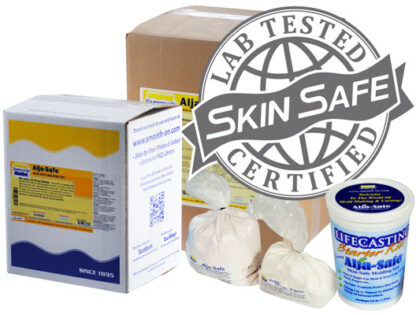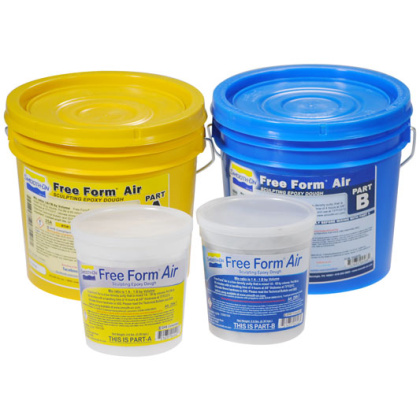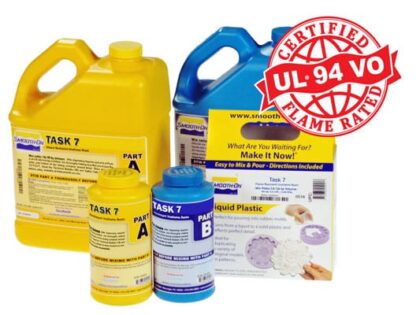The Smooth-Cast™ 300 Series of liquid plastics are ultra-low viscosity casting resins that yield castings that are bright white and virtually bubble free. Vacuum degassing is not necessary. They offer the convenience of a 1A:1B by volume or 100A:90B by weight mix ratio. The differences between them are pot life and demold time.
These resins readily accept fillers (such as URE-FIL™ 3 ) and can be colored with SO-Strong™ or Ignite™ color tints (Smooth-Cast™ 325 series accepts pigments better than the Smooth Cast™ 300 series). Fully cured castings are tough, durable, machinable and paintable. They resist moisture and mild solvents. Applications for Smooth-Cast™ 300 Series Liquid Plastics include reproducing small to medium size sculptures, making prototype models, special effect props and decorative jewelry.
Those interested in making roto cast pieces should refer to the Smooth-Cast™ 65D technical bulletin.
Instructions
Safety – Materials should be stored and used in a warm environment (73° F / 23° C). These products have a limited shelf life and should be used as soon as possible. All liquid urethanes are moisture sensitive and will absorb atmospheric moisture. Mixing tools and containers should be clean and made of metal, glass or plastic. Mixing should be done in a well-ventilated area. Wear safety glasses, long sleeves and rubber gloves to minimize contamination risk. Because no two applications are quite the same, a small test application to determine suitability for your project is recommended if performance of this material is in question.
Applying A Release Agent – A release agent is necessary to facilitate demolding when casting into or over most surfaces. Use a release agent made specifically for mold making (Universal™ Mold Release or Mann’s Ease Release™ 200 available from Smooth-On or your Smooth-On distributor). A liberal coat of release agent should be applied onto all surfaces that will contact the plastic.
IMPORTANT: To ensure thorough coverage, apply release and brush with a soft brush over all surfaces. Follow with a light mist coating and let the release agent dry for 30 minutes. Smooth-On silicone rubber molds usually do not require a release agent unless casting silicone into the mold. Applying a release agent will prolong the life of the mold.
MEASURING & MIXING… Liquid urethanes are moisture sensitive and will absorb atmospheric moisture. Mixing tools and containers should be clean and made of metal, glass or plastic. Materials should be stored and used in a warm environment (73°F/23°C).
Stir or shake both Part A & Part B thoroughly before dispensing. After dispensing equal amounts of Parts A and B into mixing container (100A:90B by weight) and mix thoroughly. Stir deliberately making sure that you scrape the sides and bottom of the mixing container several times. Be careful not to splash low viscosity material out of the container.
POURING, CURING & PERFORMANCE…
Pouring – Pour your mixture in a single spot at the lowest point of the containment field and let the mixture seek its level. This will help minimize air entrapment.
For Best Results . . . Best results are obtained using a pressure casting technique. After pouring the mixed compound, the entire casting assembly (mold, dam structure, etc.) is placed in a pressure chamber and subjected to 60 PSI (4.2 kg/cm2) air pressure for the full cure time of the material.
Curing – Important: Use this product with at least room size ventilation or in proximity to a forced outlet air vent and do not inhale/breath fumes. Fumes, which may be visible with a significant mass concentration, will quickly dissipate with adequate ventilation. Castings with significant mass may be hot to the touch and irritate skin immediately following cure. Let casting cool to room temperature before handling.
Demold time of the finished casting depends on mass and mold configuration. Low mass or thin-walled castings will take longer to cure than castings with higher mass concentration. Smooth-Cast™ 300 will cure in 7 – 10 minutes (Smooth-Cast™ 305 in 30 – 40 minutes and Smooth-Cast™ 310 in 2 – 4 hours) depending on mass and mold configuration.
If making rotational or hollow castings, backfilling with a rigid foam (Foam-iT!™ 5 or other) will provide lightweight reinforcement. Foam backfilling is recommended if castings will be subjected to temperatures above 85°F / 30°C.
Post Cure – Castings will reach “full cure” faster and achieve maximum physical properties if post cured. Allow material to cure for recommended Cure Time at room temperature followed by 4 – 6 hours at 150°F/65°C. Allow casting to come to room temperature before handling.
Performance – Cured castings are rigid and durable. They resist moisture, moderate heat, solvents, dilute acids and can be machined, primed/ painted or bonded to other surfaces (any release agent must be removed). If machining cured material, wear dust mask or other apparatus to prevent inhalation of residual particles. Castings can be displayed outdoors after priming and painting. Unpainted castings will yellow over time – more quickly when exposed to ultra-violet light.
Smooth-Cast™ 300Q
Smooth-Cast™ 300Q liquid plastic is a quick setting, ultra-low viscosity casting resin that yield castings that are bright white and virtually bubble free. Vacuum degassing is not necessary. It offer the convenience of a 1A:1B by volume or 100A:90B by weight mix ratio.
This resin readily accept fillers (such as URE-FIL™ 3 from Smooth-On) and can be colored with SO-Strong™ or Ignite™ color tints (Smooth-Cast™ 325 series accepts pigments better than the Smooth Cast™ 300 series). Fully cured castings are tough, durable, machinable and paintable. It resists moisture and mild solvents. Applications for Smooth-Cast™ 300Q Liquid Plastics include reproducing small to medium size sculptures, casting into alginate molds, making prototype models, special effect props and decorative jewelry.
Those interested in making roto cast pieces should refer to the Smooth-Cast™ 65D technical bulletin.
Features
- 30 Second Pot Life – can be poured in alginate molds
- Easy to measure and mix – 1:1 mix ratio by volume – no scale required
- Low viscosity – captures excellent detail
- Resin cures to a bright white finish
Data At-A-Glance
| Mix Ratio By Volume |
1A:1B |
| Mix Ratio By Weight |
100A:90B |
| Pot Life |
30 seconds |
| Cure Time |
5 minutes |
| Shore Hardness |
70 D |
| Specific Gravity |
1.05 g/cc |
| Specific Volume |
26.4 cu. in./lb. |
| Color |
White |
| Heat Deflection Temp |
120 °F |
| Tensile Strength |
3,000 psi |
| Tensile Modulus |
139,500 psi |
| Elongation @ Break |
5 % |
| Flexural Strength |
4,510 psi |
| Flexural Modulus |
128,000 psi |
| Compressive Strength |
4,000 psi |
| Compressive Modulus |
45,800 psi |
| Shrinkage |
0.01 in. / in. |
| Mixed Viscosity |
80 cps |








